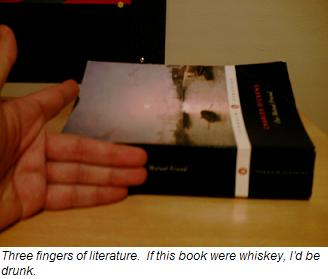No Friend of Mine
 I've spent some amount of time every day for the past two weeks plugging away at this 800-page monstrosity. The last 40 or so pages were the slowest. I felt so close to the end that it hardly seemed worth pushing myself anymore. I mean, 40 pages out of 800 -- what's the rush? I can do 40 pages standing on my head. Eventually, though, I steeled myself and finished it off.
I've spent some amount of time every day for the past two weeks plugging away at this 800-page monstrosity. The last 40 or so pages were the slowest. I felt so close to the end that it hardly seemed worth pushing myself anymore. I mean, 40 pages out of 800 -- what's the rush? I can do 40 pages standing on my head. Eventually, though, I steeled myself and finished it off.

I complain all the time about just how long this novel is, but it's difficult to express how much longer it feels. It may make me unpopular(er) to say this, but Dickens gets on my nerves. There are some nice moments, sure, when I can genuinely enjoy his prose, and maybe once every 50 pages or so I chuckle to myself, but in general I found this novel to be tiresome and overblown. Charles Dodgson, aka Lewis Carroll, called it "genius," so I don't feel completely secure in bashing it, but I'd like to think that the difference between modern and Victorian standards in writing have something to do with it, but not even that fully explains it. I've enjoyed everything else we've read, and that's all been as Victorian as Dickens. By sheer size alone, Our Mutual Friend is worth a Lady Audley's Secret, a What Maisie Knew, and half a Peter Pan, but I didn't enjoy it nearly as much as any of these.

If I were in a novel-writing workshop and someone handed this book to me, I'd have a surfeit of negative comments. Apart from a few exceptions, most of the "characters" are one-dimensional caricatures. They're characterizations, not convincing people. Everyone in this book has seemingly had an identifying phrase -- "I know his tricks and manners," "I earn my living by the sweat of my brow," "A literary man -- with a wooden leg," etc. -- issued to him at birth, which he is contractually obligated to utter upon every appearance. They're fine at first, but after the first three or twenty times, they turn stale. Instead of mannerisms or tics, some characters seem to have obsessive-compulsive behaviors which they are compelled to perform ad nauseum, like Fledgeby and his desperate search for whiskers. I know the purpose of these little quirks, but they occur with such frequency that they quickly stop being quirks and turn into annoyances for the reader ("the reader," here, being me).
Dickens is crazily repetitive, too, sometimes filling an entire paragraph (or the better part of a page) with several iterations of the same long phrase. If there's wit to be had the first time, it's definitely worn out its welcome by the fourth time. In other instances, the phrase in question isn't especially lengthy, but it shows up with a clockwork predictability that soon renders it dull. An example I can think of off the top of my head is the description of a character "disappearing" into her lover's arms. Fine, she disappears. Great. But Dickens hits this word again, and again, and again... it's clever once, maybe, but every single time? This kind of repetition feels forced, or worse, self-consciously witty. Ugh. I hate that.
One or two of the names have the same effect. I know Dickens is known for having unique names for his characters, which is admirable and all, but some of the names in Our Mutual Friend are just... well, dumb. Sloppy, for example. There's a guy named Sloppy. That sounds like something out of Blackadder. By the way, Sloppy's obligatory physical trait is that he opens his mouth very wide when he laughs, and he wears a lot of buttons (which I don't get at all -- does he sew them on or something, and if so, why?).
I found that I was happy whenever a character died and disappointed when he fought off the grim specter of Death to cling to life for several hundred pages more. More than a few of them bite it, which is considerate of the author, but they sure take their sweet time about it. Some are idiotic, but never get called on it for some reason; others get entirely undeserved happy endings. It's a complicated plot, with dozens of characters who hold various relationships with one another (thus the title), but we still get a trite ending: all the good people are happy, and all the bad people (with one exception) are dead. At least Mary Braddon apologizes for her happy ending in Lady Audley's Secret: "I hope no one will take objection to my story because the end of it leaves the good people all happy and at peace." It's not that I object to a happy ending, but in this case, things are less interesting when everything works out in the end.
But don't tell Therie I said any of this. Trying to get a good grade here.
(Speaking of which, I got an A on my first paper, in case you're curious.)

1 Comments:
Oddly enough, she opened the discussion on OMF with Henry James' criticism of it, in which he called it "a baggy monstrosity," so I felt comfortable enough to criticize it too. Which is good, because otherwise I'm not sure what I would've said about it.
Post a Comment
<< Home